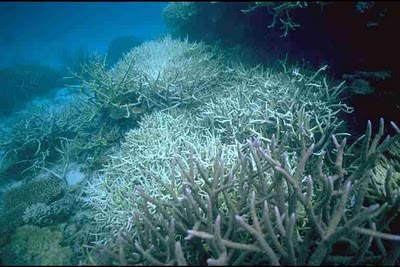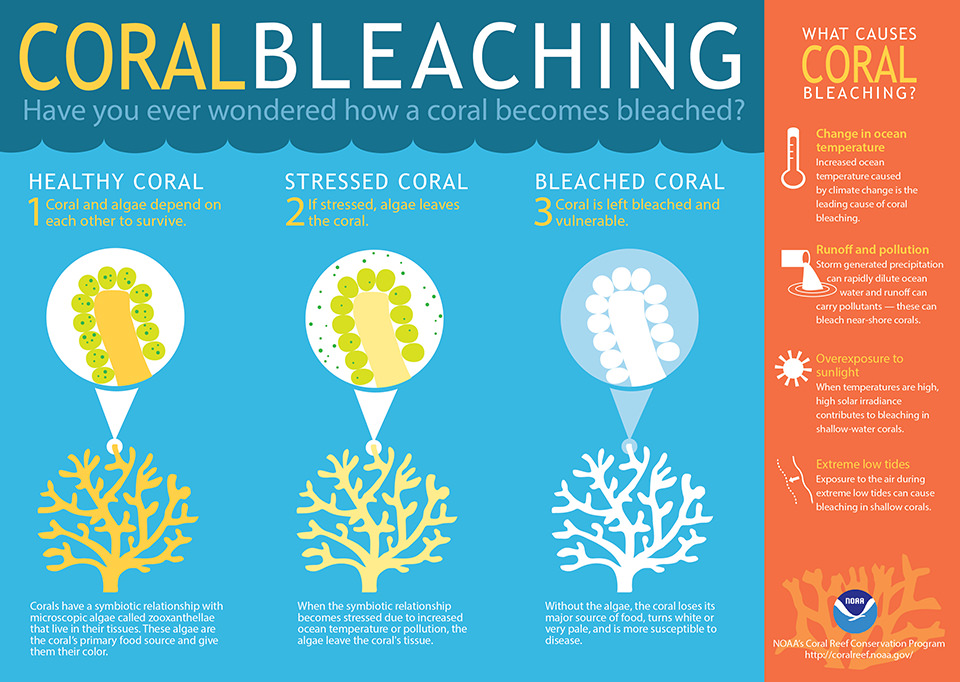 Occupying less than one percent of the Earth’s surface and less than two percent of the ocean floor, it would be easy to overlook the significance of coral. In fact, 25% of all marine species depend on coral reefs for survival. In addition, for humans, coral provides shoreline protection, medicine, food, and an incentive for ecotourism to the sum of ~$50 million annually.
Occupying less than one percent of the Earth’s surface and less than two percent of the ocean floor, it would be easy to overlook the significance of coral. In fact, 25% of all marine species depend on coral reefs for survival. In addition, for humans, coral provides shoreline protection, medicine, food, and an incentive for ecotourism to the sum of ~$50 million annually.
Coral belong to the phylum Cnideria; closely related to sea anemones and jellyfish. Although they begin their lives as mobile medusa, they spend their adulthood as sessile polyps. Coral secrete calcium carbonate to form a hard exoskeleton in which the polyps live. Within the polyps are photosynthetic algae called zooxanthellae, which not only give coral food but also their vibrant colors.
Currently, scientists are seeing the largest coral bleaching events in history. An increase in ocean carbon dioxide concentration causes water temperature to increase and become more acidic. Overtime, the significant environmental change stresses coral causing them to expel their symbiotic algae. The end result is a white coral polyp that is vulnerable disease and starvation.
Before 1998, coral bleaching events were practically nonexistent. In 2005, more than 50% of the coral reefs within the Caribbean have died. In addition, in 2010, water temperature in the Florida Keys fell by 12.1 degrees F, forcing an incredibly devastating bleaching event. Most recently, Australia’s iconic Great Barrier Reef is experiencing an unprecedented die-off.
While bleaching is an incredible stressor, it is not a death sentence. To help prevent further damage to our oceans there are several things that we can do in our day-to-day lives. Do not use chemically enhanced fertilizers, insecticides, and pesticides in your yard. As all water ends up in the oceans, chemicals carried by water are taken along for the ride. Similarly, be an informed consumer when purchasing health and beauty products. Tiny pieces of plastic called microbeads are added to face wash, toothpaste, and body wash to increase their abrasive properties. Much like chemicals, microbeads get washed down our drains and eventually into the ocean where they are ingested by corals. If you are a diver or snorkeler, please STAY OF THE CORAL. It is a privilege to visit these beautiful underwater worlds. If you do not have the buoyancy skills to keep from standing on, bumping, or dragging equipment across the reefs stay home. As our planet only has limited fresh water reserves, conserve water when you can. Do your part to reduce your carbon footprint. Breaking our dependency on fossil fuels will subsequently decrease carbon dioxide production that could irreversibly change our oceans.
As Dr. Sylvia Earle would say, “No blue, no green.” Now is the time to make the changes necessary to ensure our diverse coral reefs continue to be a place of great diversity and beauty.
